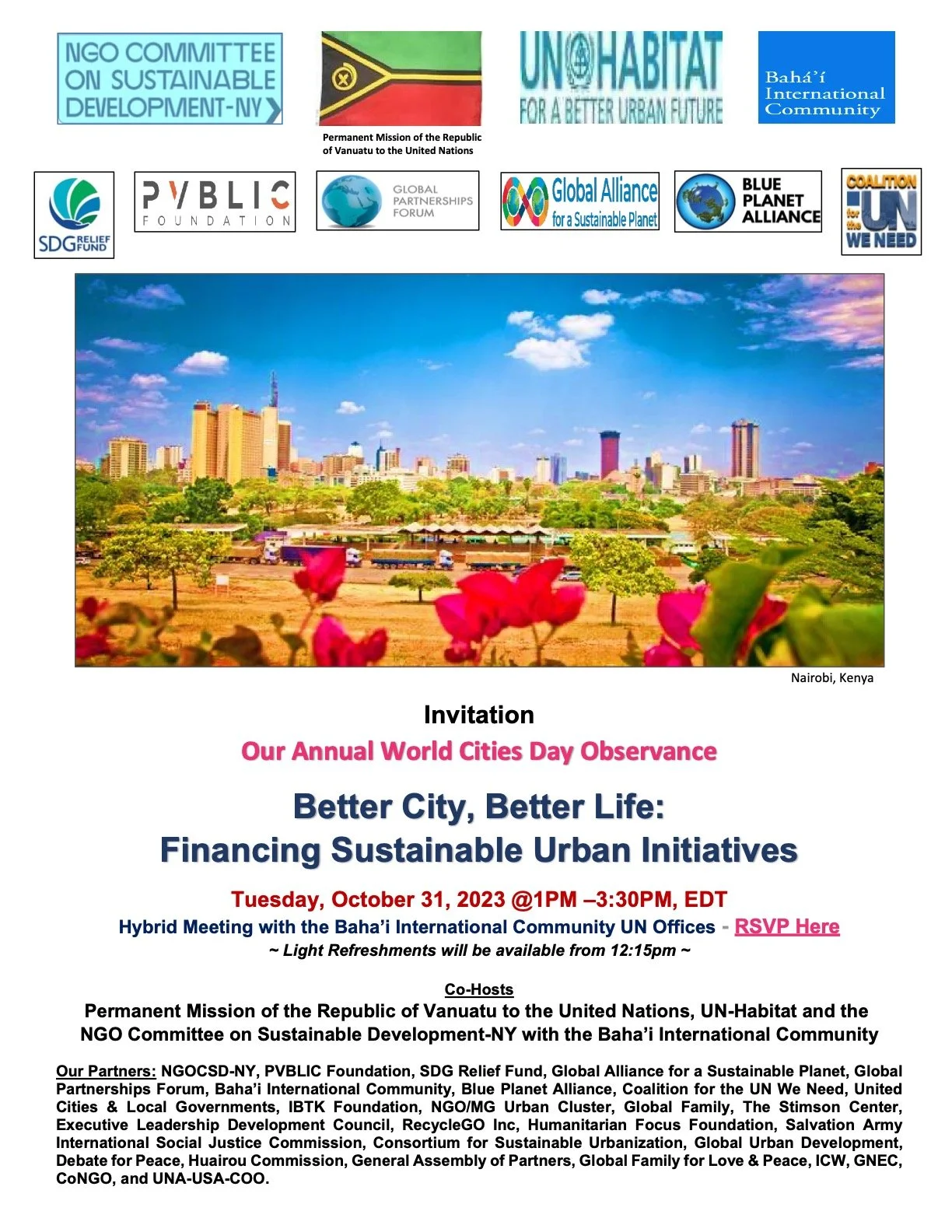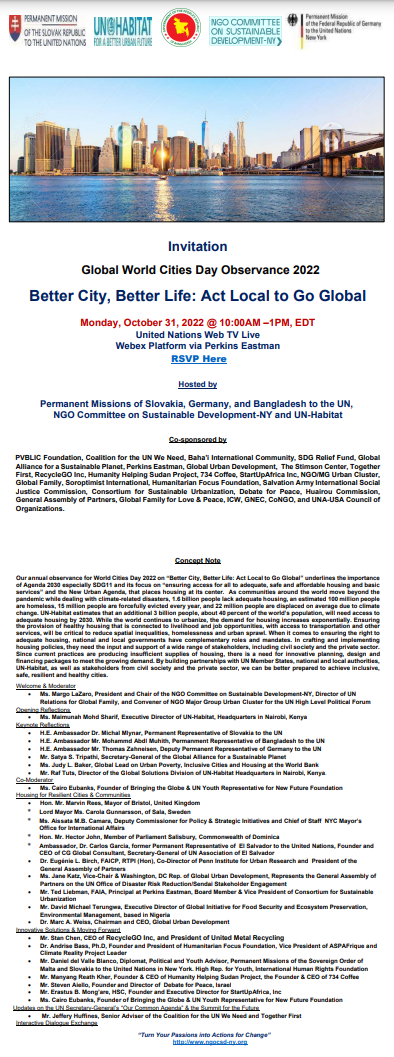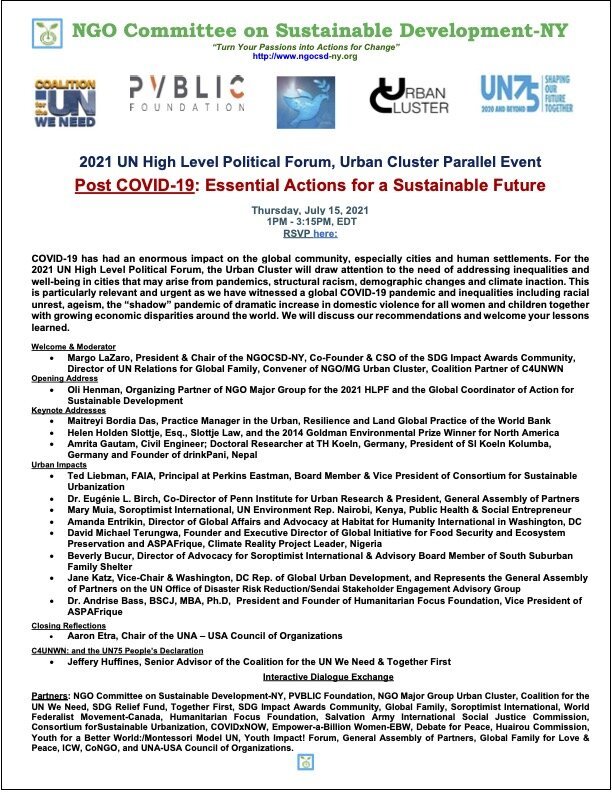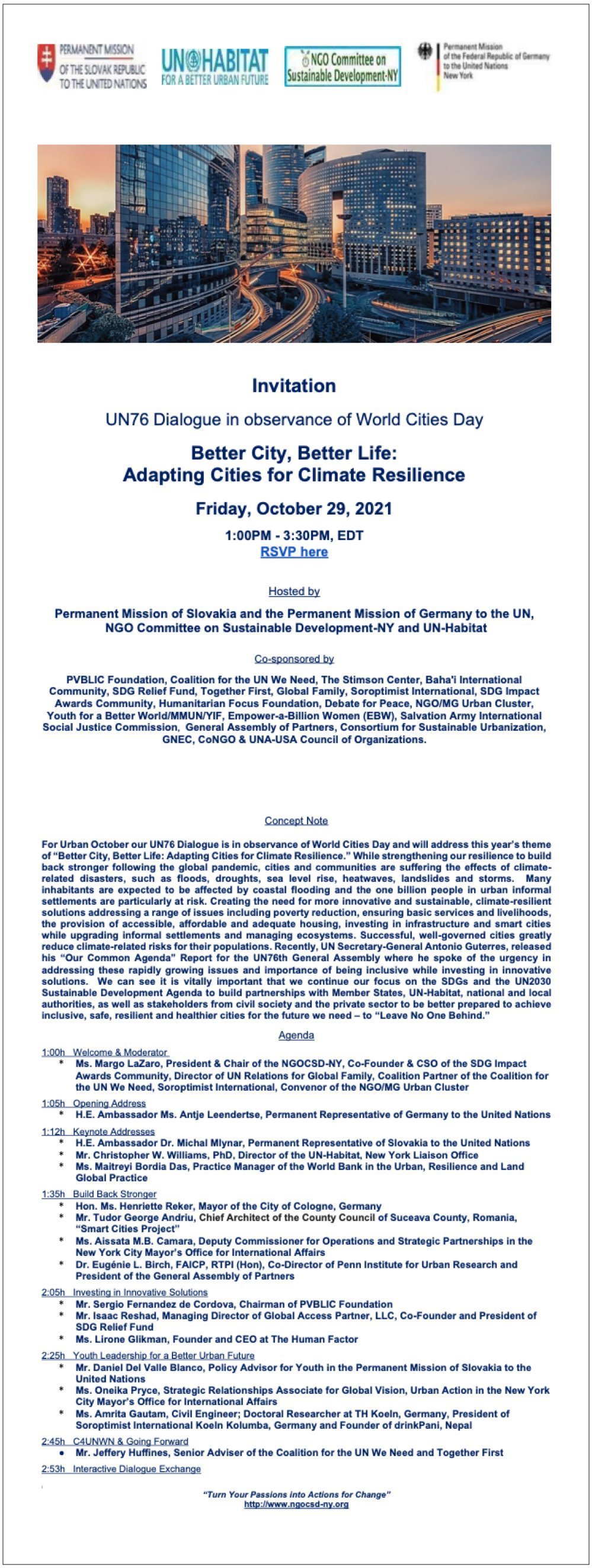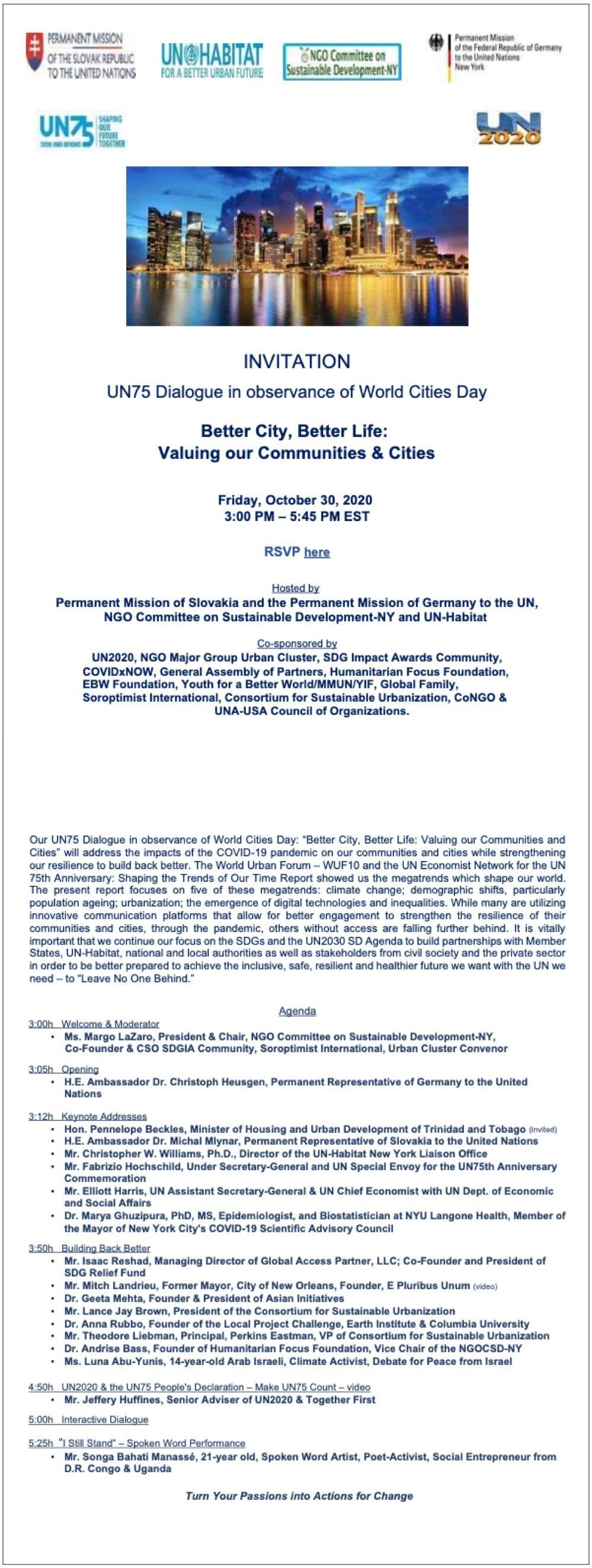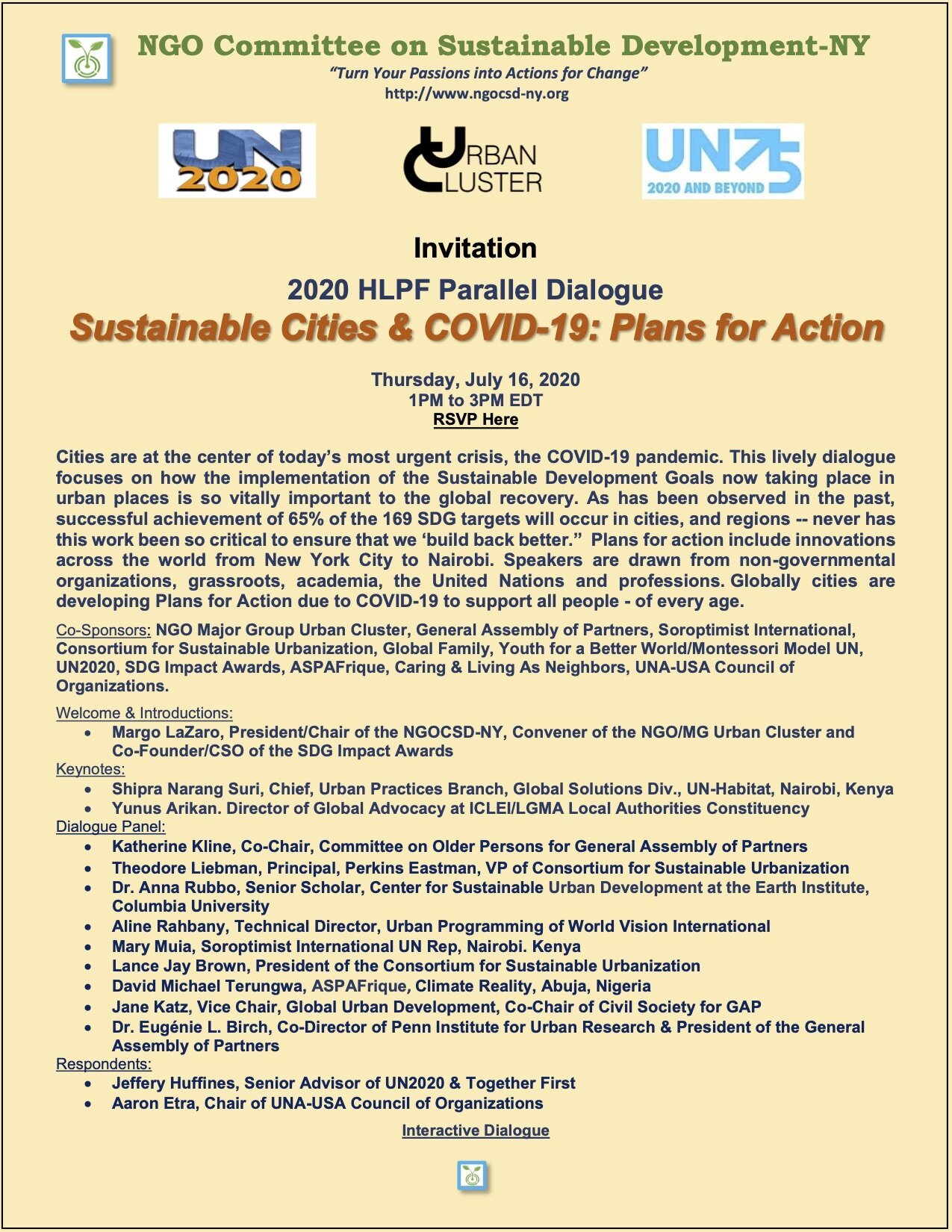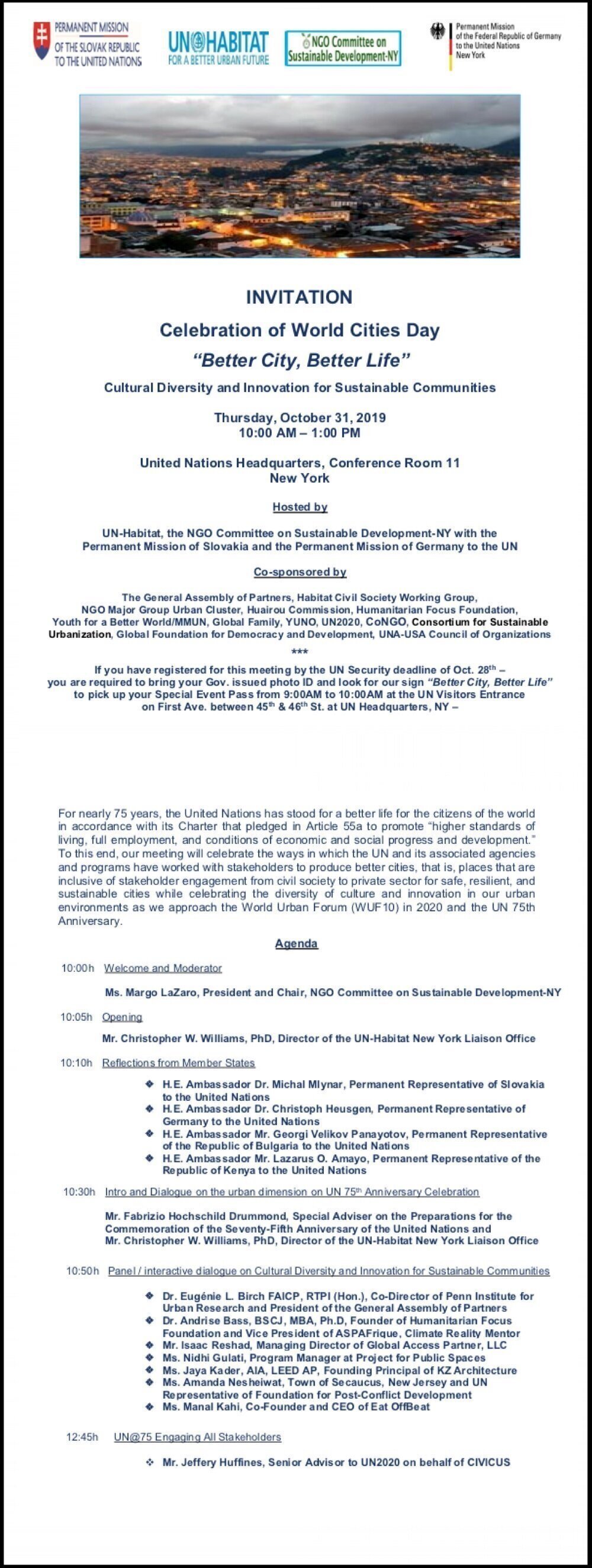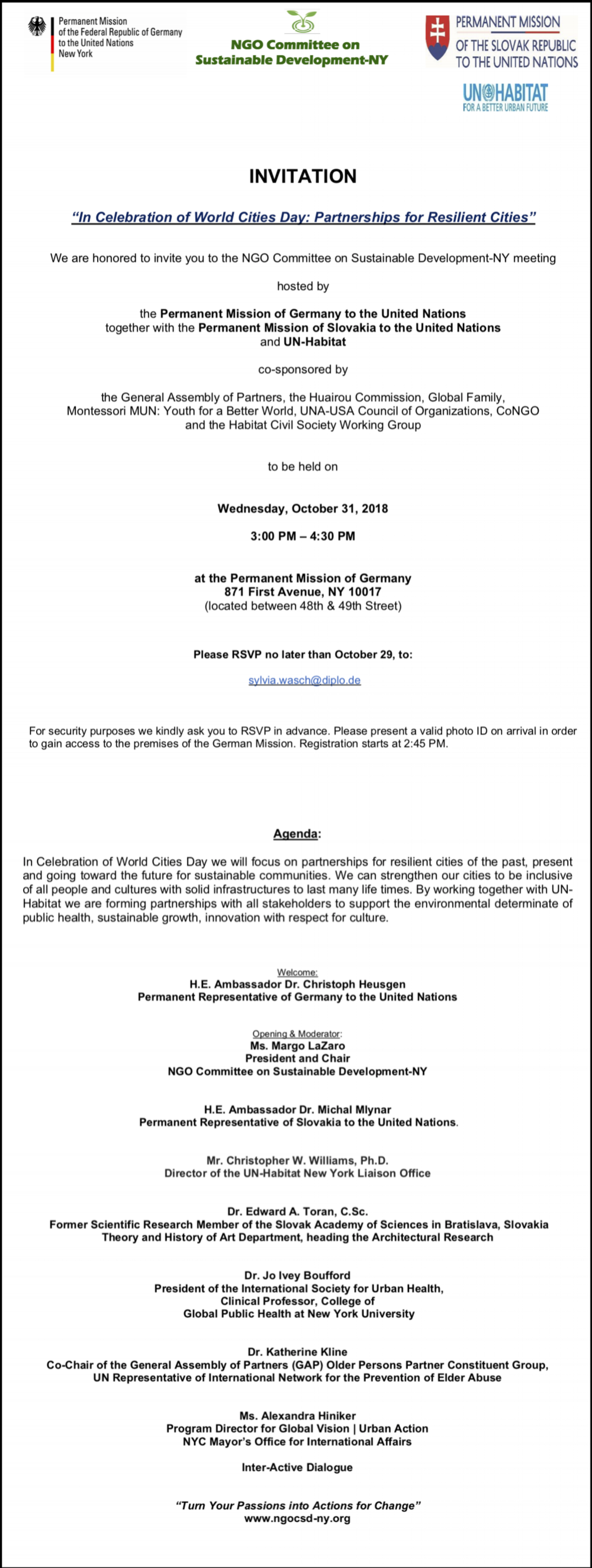
NGO Major Group Urban Cluster
NGO-Major Group Urban Thematic Cluster 2024 HLPF Position Paper
NGO-MG Urban Thematic Cluster 2024 HLPF Position Paper (Document)
INTRODUCTION:
The NGO Major Group Urban Thematic Cluster (“Urban Cluster”), aligns with the UN High Level Political Forum for the Sustainable Development Goals, UN-Habitat, the New Urban Agenda, including the UN Secretary General Antonio Guterres’ “Our Common Agenda and the 2024 UN Summit of the Future. The Urban Cluster recognizes that with an estimated twothirds of humanity - 6.5 billion people of all ages - living in cities by 2050, increasingly from the developing world, governments cannot achieve sustainability, resilience, and poverty reduction without significantly transforming the way we plan, design, build, and manage our urban areas to “Leave No One Behind. “
The Urban Cluster draws attention to the need to address inequalities and challenges to well-being in cities that may arise from pandemics, structural racism, demographic changes, discrimination against persons with disabilities and climate inaction. This is particularly relevant and urgent as we have witnessed the consequences of a global COVID-19 pandemic and inequalities, including racial unrest, ageism, the “shadow” pandemic of dramatic increase in domestic violence for all women and children together with growing economic disparities around the world.
As a majority of the world’s population lives in urban places that extend from urban to rural, the Urban Cluster addresses how Sustainable Development Goal SDG 11 (“Make cities and human settlements inclusive, safe, resilient, and sustainable”), integrates with the other 16 SDGs, and with other global agreements, such as the Paris Agreement, the Sendai Framework for Disaster Risk Reduction. The Urban Cluster aligns with the New Urban Agenda and the documents developed for its localization from the civil society perspective.
As more than 190 countries endorsed the SDGs to address the global challenge of eradicating poverty and achieving sustainable development in a balanced, equitable, integrated, and cross sectoral manner, the Urban Cluster is focused on SDG 11 as a means to ensure access to safe, adequate, accessible and affordable housing, upgrading and legalizing informal settlements, investing in public transport, creating accessible and safe green public spaces, protecting natural and cultural heritage, reducing adverse effects of natural disasters and the impacts of climate change on cities while improving urban planning and supporting innovative management and governance. The Urban Cluster holds that balanced territorial development should guide national, regional and local policies in fulfillment of SDG 11 which needs to be seen as cross cutting as it relates to other SDGs. Broad stakeholder participation inclusive of marginalized groups often left behind in the formulation, implementation, and monitoring of such policies is essential.
2024 UN HIGH LEVEL POLITICAL FORUM (HLPF):
The theme of the 2024 HLPF is "Reinforcing the 2030 Agenda and eradicating poverty in times of multiple crises: the effective delivery of sustainable, resilient and innovative solutions”. (A/DEC/77/553) The HLPF in 2024, without prejudice to the integrated, indivisible and interlinked nature of the Sustainable Development Goals, will review in-depth: Goal 1. End poverty in all its forms everywhere; Goal 2. End hunger, achieve food security and improved nutrition and promote sustainable agriculture; Goal 13. Take urgent action to combat climate change and its impacts; Goal 16. Promote peaceful and inclusive societies for sustainable development, provide access to justice for all and build effective, accountable and inclusive institutions at all levels; and Goal 17. Strengthen the means of implementation and revitalize the Global Partnership for Sustainable Development.
SDG 1 - End Poverty: Poverty intersects all other SDGs and unless addressed, all other goals will not be met. Ending poverty is critical for achieving all of the other goals.
Recommendations: We advocate for the end of poverty around the world with guaranteed and secure tenured shelter, land ownership, and other provisions that ensure that poverty will decline. We advocate for fair sharing of the world’s resources and lobby for raising the income of all to guarantee a minimally healthy quality of life.We support ending poverty and hunger through economic empowerment of vulnerable communities which are interconnected issues that are human rights in nature. We advocate for partnerships and collaboration in addressing climate change, biodiversity loss and ending pollution. We encourage utilizing entrepreneurship training and education as an avenue towards eradicating poverty and creating decent jobs through investment opportunities with private sector and institutional support.
G 2 - End Hunger: With the impact of rising conflicts, wars, disasters, climate change, economic downturns, and political unrest, we are seeing more famine, food shortages, and starvation throughout the world. Distribution channels have been blocked in many countries; floods and droughts have impacted farmers so that agricultural land cannot produce enough for the basic needs of people. Ending hunger is critical for achieving all of the other goals.
Recommendations: We promote global food security through equitable food production and distribution to meet the challenges of regional conflicts and climate change and issues of supply chains. We share our concerns about having healthy and nutritious food options both locally and globally. We advocate for urban farming by planting urban farms in open spaces and rooftops in cities and communities and encouraging the growing of vegetables and making them accessible to the people. We suggest that parking garages and ramped parking can be used for food production – being converted and unused factory space can be converted. Schools engaging in food production and teaching students. We need investing in urban farming to have healthy food options. Urban farming reduces traffic congestion and pollution with less delivery by trucks and cars - help climate change by reducing pollution, people in urban neighborhoods are working together to create communities. Safe and clean water is also part of essential food security for all. Note: We advocate for treating SDG 1 and 2 together – as intricate – interconnected SDGs
SDG 13 - Combat Climate Change: Supporting a sustainable and resilient approach is critical to address the devastating effects of climate change especially in urban areas and communities globally. As we have witnessed recent devastation and collapses in building structures as a result of major earthquakes, floods, lack of enforcement and monitoring of building codes and standards, and major conflicts, and greed. Safe and resilient infrastructure in buildings and workplaces are critical. Innovations including 3-d printing, utilizing traditional and new materials, the advent of mass timber, and the promotion of new mechanical systems should be more fully explored and incorporated.
Recommendations: We promote the use of traditional and indigenous means and methods as well as new and innovative means to produce a well-built environment. We applaud the new loss and damage fund but hope it will be applied to the most affected people. Promote mitigation, adaptation, reuse, resilience, and disaster risk management in the planning and design of cities in the era of climate change. Invest in early warning actions and adequate housing in informal settlements as a lever to advance resilience and sustainable development.
SDG 16 - Promote peaceful and inclusive societies: In this world of increasing conflict, exclusion, and discrimination, now, more than ever, we need to support and respect people who are being left behind.
Recommendations: We recognize contributions of community leaders and provide them tools needed for a better future. Create cultures of peace and learn from each other. Urban environments come together with those of diverse backgrounds and cultures. Migration helps create diversity of customs and culture. Communication and conflict resolution are important to have peaceful societies. We advocate for equity and access in order to create inclusive communities and cities.
SDG 17- Partnerships: The Urban Cluster will continue to focus on new opportunities to bring attention to the importance and need to address issues of sustainable urbanization, resilience, mobility, health and wellness and the public realm. We urge Member States and Local Authorities to support the right to the city, including affordable and accessible housing, for all people to be able to live with equity, equality, inclusion and dignity.
Recommendations: The NGO Committee on Sustainable Development-NY and the Urban Cluster actively promote the need to build cohesive and inclusive partnerships with all stakeholders, including UN Member States, UN Agencies, academia, civil society, and the private sector, to support UN-Habitat in the implementation of the New Urban Agenda to design equitable spatial, social, environmental and economic aspects of the SDGs to accelerate their implementation.v
Position Paper aRchive
-
Convener: Margo LaZaro, NGOCSD-NY
Notes: Katherine Kline, GAP
Marta Benavides – El Salvador
Prof. Genie Birch – General Assembly of Partners
Jan Peterson – Huairou Commission
Pam Ransom Huairou Commission
Jane Katz, UN/Disaster Risk Reduction
Dan Perell, Baha’i International Community
Anna Rubbo, Columbia University
Faisal Alfadl, General Manager of Saudi Green Building Forum
Mary Muia, Soroptimist International UN Rep at UNEA - Kenya
Bev Bucur, Soroptimist International
Bette Levi, Soroptimist International
Thomas Forster – Food Cluster
David Michael Terungwa, Climate Reality
Aline Rahbany, World Vision
Arelys Bellorini. World Vision
Judith Hermanson
Ted Liebman, FAIA, a Principal at Perkins Eastman, Consortium for Sustainable Urbanization
Lance Jay Brown, Consortium for Sustainable Urbanization
Yunus Arikan, ICLEI, Germany
Luis Artieda
Sri Sofjan, Huairou Commission
Dr. Andrise Bass. Humanitarian Focus Foundation
Kakha Nadiradze
Amrita Gautam, Soropimist International, Nepal & Germany
Amanda Entrikin, Habitat for Humanity
Aliye Celik, UN Habitat
Ayushi Kundu, Soroptimist International, India


